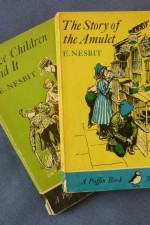Writers Write: My Favourite Book 15
Fiona Wood
My book is Five Children and It by E. Nesbit, published in 1902. It’s a novel of ‘careful what you wish for’ episodes featuring a family of children – Anthea, Jane, Robert and Cyril and their baby brother, the Lamb (Hilary) – who find a Psammead, an ancient, wish-granting Sand-fairy. There are two further titles with the same characters, The Story of the Amulet, and The Phoenix and the Carpet.
I read and re-read Edith Nesbit’s books in around grade six, at the same time I was also reading Enid Blyton , L.M. Montgomery, Susan Coolidge, C.S. Lewis and Louisa May Alcott – all of whom very obligingly wrote series.
The Puffin paperback had beautiful illustrations from the original edition, by H.R. Millar. Not that I knew it at the time, but Edith Nesbit was a prominent socialist, a founding member of the Fabian Society. Her political views provide a welcome contrast to those of Enid Blyton (writing decades later) when it comes to characters’ attitudes to, for example, gypsies or servants, or gender, for that matter.
I loved Edith Nesbit’s characters, their wonderfully good intentions and fallibility, and the impossible scrapes into which they very reliably got themselves. The characters and their worlds are real to the last detail of dirty handkerchiefs and darned stockings and sibling snipes, and it is into this lovely grimy reality that she places her stories of magic and adventure.
One of the things I can remember being charmed by was that these children so clearly from another era, with their Edwardian pinafores and petticoats, and belted Norfolk jackets, were nonetheless just like me in many respects. They got bored, they lost their tempers, fought with their brothers and sisters, they sulked, food was very important to them, they wished to behave well, but often didn’t, and then tried to make amends, not always successfully.
The adventures in Five Children and It are so logically constructed – there’s a satisfying inevitability to the consequences of the wishes, and yet a complete belief that you the reader would have been equally susceptible to the problems encountered by the children, had you been lucky enough to find a Psammead. Edith Nesbit knows how to apply the narrative clamp and not let her characters off the hook until they’ve learnt something. It helps that the Psammead is such a prickly malcontent, who could not be less interested in providing happy outcomes.
Her inventiveness, warmth, humour and humanity make Edith Nesbit’s books as fresh and readable to me now as they were when I was eleven.
‘Six Impossible Things’ is Fiona’s first book. It was published by Pan Macmillan in 2010, and shortlisted in the 2011 CBCA Awards. For more, visit Fiona’s website: www.fionawood.com


I remember reading a Secret Seven book and being annoyed at how the boys treated the girls and the girls just accepted it! But I suppose that was the attitudes of many people during the time the book was written. It’s interestinbg that these books, although written much earlier, aren’t quite like that.
Fiona, I love EE Nesbitt, too. My particular favourite is The Phoenix and the Carpet, particularly where the Phoenixe visits the Phoenix Insurance Company in London and assumes that it is her temple!
Nesbitt was a great writer